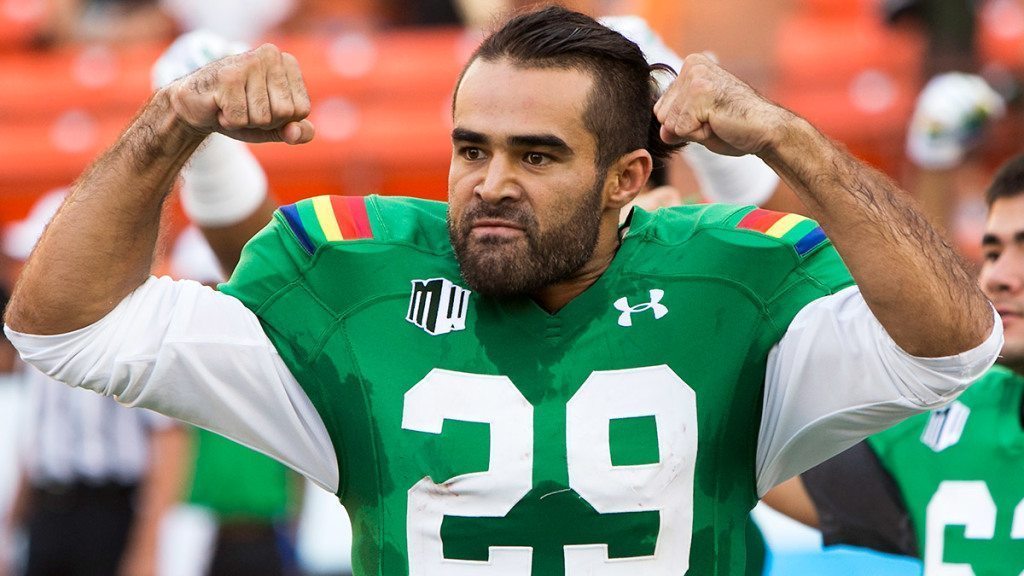Like most Americans planning a trip to Australia, Chris Demarest has a shopping list. But a didgeridoo, stuffed koala or a couple of bottles of duty free Barossa Valley shiraz are not his priority.
“What I’ll be looking for is another Scott Harding,” Demarest, the special teams co-ordinator for the University of Hawaii’s football team told AAP, referring to the former Brisbane Lions AFL midfielder.
“I want a guy like Jarryd Hayne who played rugby (league), is 26, and says, ‘To hell with it. I want to give American football a shot’.” Demarest, who will fly to Australia in mid-January shopping for athletes he can turn into gridiron players for his university, is not alone.
Just as elite rugby league players like Hayne are now looking at the NFL and college for new challenges, a sea change has happened in recruitment strategies among American teams.
Like an 1800s gold rush, recruiters are spreading across the planet to untapped regions.
College teams still seek Australian punters, but they are also keen on strong, gifted athletes with the potential of playing other key positions.
“Somebody sent me an email the other day of a really good Australian athlete down there, a wide receiver, and so we are right now investigating him to see if he is a possible guy for us,” Kyle Whittingham, head coach at the University of Utah, said.
“We have been to Samoa, Tonga and New Zealand.
“It has worked out well for us.” Demarest and Whittingham have Australians on their current squads.
The University of Hawaii had rugby union convert Colin Scotts in the 1980s and more recently punters Mat McBriar, who went on to play a decade in the NFL, and Alex Dunnachie, whose big boot was a weapon until a DUI conviction in 2012 led to a suspension.
“I was wondering what the heck I was going to do when Alex was out and then I saw Scotty Harding fooling around kicking the football with his left foot, right foot and while running to his left or right,” the special teams co-ordinator laughed.
Jarryd Hayne during a training session at Parramatta. Picture: Gregg Porteous Source: News Corp Australia
Brisbane-born Harding quit the AFL after six seasons, took up a scholarship at Hawaii in 2011 and was on the team as a wide receiver and punt returner.
“I said, ‘Can you punt like that on a regular basis?’” Demarest asked Harding.
“He said, ‘Oh yeah coach’.” Demarest drew up new, unconventional plays to capitalise on Harding’s ability to move laterally across the field and use up seconds before launching a pinpoint kick.
Because of the time Harding soaks up before kicking, the opposition punt returner is ringed by Harding’s teammates when the ball eventually lands.
“It’s revolutionised the way we punt at the college level,” Demarest said.
“He never kicks it the same way twice.
“It has that crazy Aussie spin on it, sometimes it rolls along the ground, sometimes it is to the right, sometimes to the left. “In the past two years we have created 10 turnovers on our punt coverage.
“That’s unheard of.
“In punt return yards against us, I think it is 0.0411.
Harding before he was awarded a scholarship to play for the University of Hawaii Warriors following a successful trial there. Picture: Paul Loughnan
“Again, it’s unheard of.” Australian punters have infiltrated college football, with three of the top four punters in terms of gross yards from Down Under — Utah’s Tom Hackett, Wake Forest’s Alexander Kinal and Harding. Hackett is one of three players short-listed for this year’s Ray Guy Award, college punting’s elite prize won last season by another Aussie, Tom Hornsey.
Whittingham remembers the first time he saw Hackett, a former Australian Rules star at Melbourne’s Scotch College, wander on to a practice.
Hackett didn’t have much experience or a scholarship, but had a strong leg and with a bit of polish, became a weapon for the Utes, leading the nation this year with 46.5 yards per punt.
When Hackett leaves next year, Whittingham has another Aussie punter lined up.
“In terms of recruiting, everybody knows about the players in the US,” Whittingham said.
“Players in Australia?
“That’s a different deal.
“You have a good chance at finding a diamond in the rough in places like Australia.”
Source: foxsports.au.com

